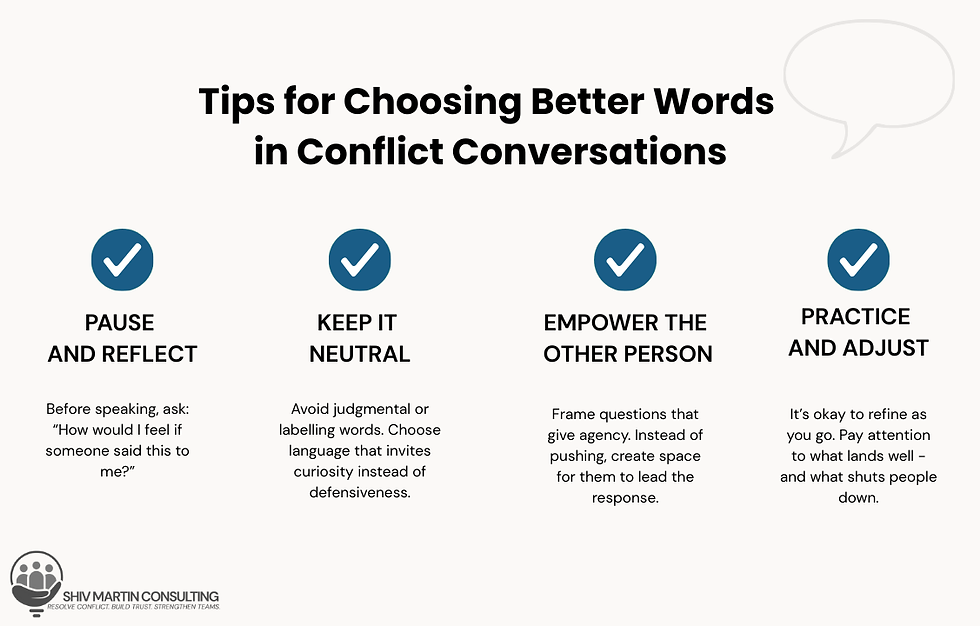Holidays and Conflict
- Shiv Martin

- Jun 18, 2024
- 4 min read
Updated: Nov 17, 2025
These holidays we headed to the beach and my hope was that there will be no conflict to resolve, except for the inevitable conflicts that will occur within our family. I know I'm not alone here, but vacations certainly have a way of creating family conflict. Have you ever wondered why? Especially when we are all meant to be so relaxed, having fun and being grateful...

Why We Fight on Holidays (Even When We Don’t Mean To)
While holidays promise relaxation and joy, they often bring stress, pressure, and emotional friction.
We're more likely to snap, argue, or feel misunderstood when:
We’re stressed or anxious (even if it’s “good stress”)
We’re unsure about our surroundings, especially if safety, health or logistics are unclear
Reality doesn’t meet our expectations
Plans change and people aren’t on the same page
Communication is unclear or misaligned
Time, energy, or money is running out
Sound familiar?
For most of us, that tension starts before we’ve even gotten in the car!
Here's an excellent article I found on the topic. How to stop fighting on vacation - Los Angeles Times (latimes.com) I actually read this with my kids before we go. It helps them to understand why their parents are so stressed, and hopefully it reminds me to calm down.
So, if you are just returning from holidays and you had some pretty gnarly discussions during your time away, I encourage you to give yourself some space and some time and to restart those discussions when you're feeling a little bit more secure and settled in back at home.
What This Has to Do With Conflict Management
Now, don’t worry, I’m not here to give you parenting advice. That’s definitely not my lane.
But I am here to point you to some resources I’ve been building over the last few months.
While I took a break, my blog definitely didn't. Here you can find useful topics there like:
Practical guides on mediation and conciliation
Insights into trauma-informed approaches
Real-world reflections on good faith, procedural fairness, and conflict coaching
Tools for handling workplace and service user disputes with care
Featured Resource: Managing Challenging Interactions – An Inclusive Approach
One of the most requested training topics in my work with government agencies, HR teams, and complaints officers is how to manage challenging behaviour. Think:
De-escalating hostility
Navigating unreasonable conduct
Communicating under pressure
Supporting wellbeing while staying effective
I’ve designed and delivered training on this topic for over a decade. Now, for the first time, I’ll be offering it as a public course later this year.
The session is grounded in my cross-disciplinary expertise in:
Law and mediation
Mental health and lived experience
Cultural safety and inclusive practice
This isn’t just about handling difficult conversations - it’s about protecting yourself, staying grounded, and promoting respectful, fair interactions in high-pressure roles.
The training includes:
Practical de-escalation strategies
Frameworks for inclusion and safety
Human rights and procedural fairness principles
Communication tools grounded in neuroscience and real-world practice
If your team is planning professional development for the next financial year, now is the perfect time to connect.
Find out more here → Managing Challenging Interactions

Managing challenging interactions? Focus on these concepts and take care of yourself!
"Shiv’s workshops are the most practical and affirming training I’ve attended. I walked away with real tools and a better understanding of how to protect my wellbeing while handling complex complaints.” — Participant, Government Complaints Team
❓ Frequently Asked Questions
1. Why does conflict increase on holidays?
Because we’re out of our routine, under pressure, and juggling expectations. It’s not a failure—it’s human.
2. Can these same conflict triggers show up at work?
Absolutely. Time pressure, unclear communication, and unmet expectations are core drivers of workplace conflict too.
3. What makes your “Challenging Interactions” training different?
It’s grounded in legal, psychological, and cultural frameworks and includes practical, inclusive tools that can be used immediately.
4. Can I book this training privately for my team?
Yes, I offer tailored in-house workshops as well as the public version. Just reach out for a quote.
5. How can I stay updated on your courses and blogs?
Subscribe to my blog or follow me on LinkedIn for updates and reflections from the pointy end of conflict work.
If you’d like to see how facilitated conversations could help your workplace, I’ve created a free 10 Question Checklist. This guide outlines the key steps of running a structured conversation, with prompts and tips you can use straight away. Download your free DIY Facilitated Conversations guide here
Ready to strengthen conflict management in your workplace or organisation? Explore my mediation and training services, or book a complimentary confidential consultation with me today: Book Online
Shiv Martin is a nationally accredited mediator, practicing solicitor, conciliator, decision-maker, and certified vocational trainer. With extensive experience in complex dispute resolution, stakeholder engagement, and team building across business, community, and governmental sectors, Shiv brings over a decade of unique and diverse expertise in Law, Management, Vocational Education, and Mediation.
I’d love to stay connected 👉 Subscribe to my blog for more insights on workplace conflict management, conciliation, and leadership coaching.






Comments